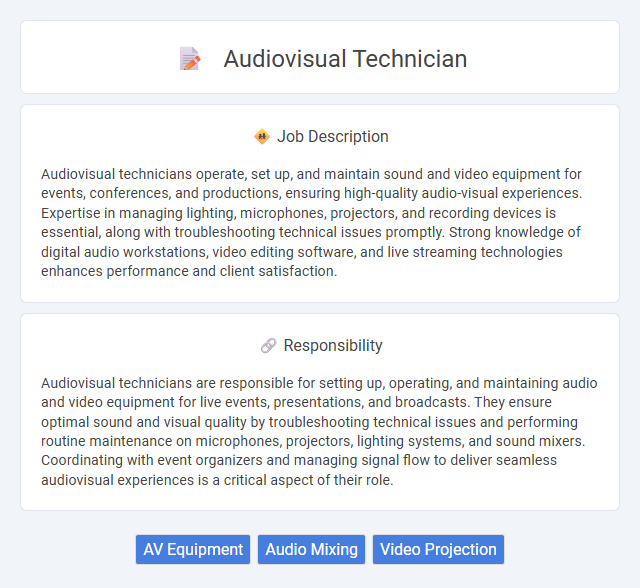
Audiovisual technicians operate, set up, and maintain sound and video equipment for events, conferences, and productions, ensuring high-quality audio-visual experiences. Expertise in managing lighting, microphones, projectors, and recording devices is essential, along with troubleshooting technical issues promptly. Strong knowledge of digital audio workstations, video editing software, and live streaming technologies enhances performance and client satisfaction.
Individuals with strong technical skills and a passion for multimedia equipment are likely suitable for an audiovisual technician role, as it demands proficiency in handling sound, lighting, and video systems. People who thrive in fast-paced, detail-oriented environments where troubleshooting and timely problem-solving are essential probably find this job fitting. Those uncomfortable with irregular hours or physically demanding tasks might be less suited for this profession.
Qualification
Audiovisual technicians require specialized training in operating and maintaining sound, video, and lighting equipment, often obtained through technical certificates or associate degrees in audiovisual technology. Proficiency in troubleshooting AV systems, understanding signal flow, and familiarity with industry-standard software such as Adobe Premiere Pro, Pro Tools, and Crestron control systems are essential qualifications. Strong communication skills and hands-on experience gained through internships or entry-level roles further enhance a technician's capability to support live events, presentations, and broadcast productions effectively.
Responsibility
Audiovisual technicians are responsible for setting up, operating, and maintaining audio and video equipment for live events, presentations, and broadcasts. They ensure optimal sound and visual quality by troubleshooting technical issues and performing routine maintenance on microphones, projectors, lighting systems, and sound mixers. Coordinating with event organizers and managing signal flow to deliver seamless audiovisual experiences is a critical aspect of their role.
Benefit
Audiovisual technicians likely experience benefits such as hands-on experience with cutting-edge technology and diverse work environments, which can enhance their technical skills and career prospects. The job probably offers opportunities for networking within media and event production industries, potentially leading to increased job security and advancement. Flexible schedules and varied projects may contribute to overall job satisfaction and work-life balance.
Challenge
Audiovisual technician roles often involve the challenge of rapidly troubleshooting technical issues during live events, where precision and quick problem-solving skills are likely critical. The probability of encountering complex equipment malfunctions requires a strong understanding of various audiovisual systems and adaptability under pressure. Meeting tight deadlines and managing unexpected technical failures may frequently test an audiovisual technician's resilience and expertise.
Career Advancement
Audiovisual technicians often advance their careers by gaining expertise in emerging technologies such as virtual reality and advanced broadcast systems. Certifications in systems integration and network engineering enhance job prospects and open pathways to senior roles like technical director or audiovisual project manager. Experience in large-scale event production and proficiency with cutting-edge audiovisual equipment significantly contribute to upward mobility within the industry.
Key Terms
AV Equipment
Audiovisual technicians specialize in setting up, operating, and maintaining AV equipment such as projectors, sound systems, microphones, and lighting consoles to ensure seamless presentations and events. Proficiency with digital mixers, video switchers, and amplification systems is essential for optimizing audio-visual quality in live and recorded settings. Routine troubleshooting and calibration of AV technology supports uninterrupted communication and media delivery across corporate, educational, and entertainment environments.
Audio Mixing
Audiovisual technicians specializing in audio mixing operate advanced sound equipment to balance, enhance, and synchronize audio tracks for live events, broadcasts, or recordings. Mastery of digital audio workstations (DAWs) and soundboard consoles ensures clear, professional sound quality tailored to venue acoustics and client specifications. Expertise in real-time sound adjustment and troubleshooting is critical to delivering seamless, immersive audio experiences.
Video Projection
Audiovisual technicians specializing in video projection operate and maintain advanced projection systems for live events, conferences, and presentations, ensuring high-quality visual displays. They calibrate projectors, troubleshoot technical issues, and integrate video sources with audio and lighting equipment to create seamless multimedia experiences. Proficiency in digital video formats, signal flow, and projection mapping technologies is essential for optimizing image clarity and aligning projections accurately.
 kuljobs.com
kuljobs.com